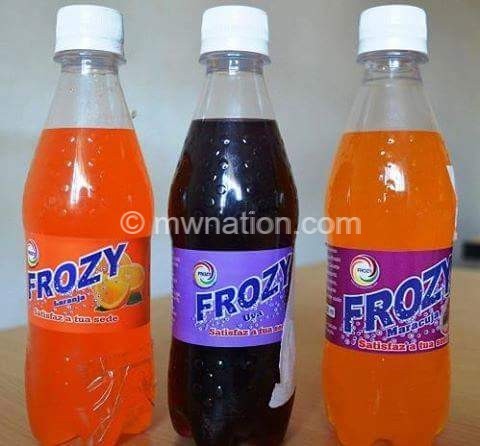Frozy selling like Indian hemp
The backlash against a sudden ban on Frozy fizzy drinks smuggled from Mozambique is not entirely symptomatic of a nation in love with foreign goods.
The public outcry is laced with undertones of citizens who wish Malawi Bureau of Standards (MBS) had acted earlier to safeguard consumers from hazardous goods.
“We like good things,” Zingwangwa resident Andrew Gama says. “When they come cheaper, we cry for more. It is puzzling that MBS allowed Malawians to consume Frozy for almost a year if the drink puts lives at risk.”
The youthful citizen rightly notes that the regulator has a life-or-death duty to ensure no one tastes hurtful products.
But MBS was not only sluggish in clamping down on the influx of the beverage that took the country by storm as early as February.

It is struggling to eliminate stockpiles of the drinks said to contain excessive citric acids and sodium benzoate, which cause cancers.
When MBS director general Devlin Chokazinga outlawed further importation, distribution and consumption of the commodity, he asked people “to declare the remaining stocks for appropriate clearing”.
But the response seems slow.
On the southern borders, smugglers are busy shipping in more stacks-evading tax much to the disappointment of Malawi Revenue Authority (MRA) which spoke against the illegal imports almost a month before MBS came barking like a bulldog.
Some Malawians are worried that the tax collectors acted faster than the bureau which is supposed to safeguard lives.
Chokazinga says it was difficult to swiftly detect inflow of Frozy because smugglers use stealthy routes.
Despite being outlawed, it is still pouring in.
On the streets, its popularity is growing and bottles are being sold undercover.
From cooler boxes and refrigerators to shop shelves, Frozy now wears new colours and names.
On a scorching Saturday afternoon, The Nation entered Zingwangwa Market where Frozy is selling like illegal drugs as shopkeepers ask several questions to ascertain the buyers are not spies.
At one shop, a trader said he gets more customers saying: “Can I have Frozy, please!”
He likened the banned business to sales of Indian hemp, saying: “It’s hot, but risky.”
The cautious seller explained: “We no longer keep it in the shop. We don’t want to be tricked.”
The traders say the crackdown has forced smugglers to stop using porous borders near Mwanza and switch to the vicinities of Muloza Border Post in Mulanje.
“The cartons are transported at night using vehicles and bicycles. The smugglers cross Muloza River, which runs between Malawi and Mozambique, to Ntambalika area where they are loaded in waiting vehicles destined for Blantyre and beyond,” said a wholesaler known as James.
Given the existing demand, he reportedly clears almost 200 dozens in two days at a wholesale price of K2 160 per dozen and K180 a bottle.
James says many people buy in bulks to hoard.
Frozy’s infiltration, popularity and affordability have marked its unusual standing as a forceful competitor of Fanta, Sprite and Coca-Cola whose availability in hard-to-reach localities is a global symbol of efficient marketing and distribution.
Unexpectedly, the ban has stirred a sensational reaction. Some Malawians asking: Why only Frozy?
“People are consuming liquids with higher acid concentration such as spirits, but you are busy banning fizzy drinks,” Duncan Msonthi wrote on MBS Facebook page.
Random interviews indicate a rampant suspicion that the order was somewhat prompted by an invisible hand, but MBS downplayed this conspiracy theory.
Samuel Kaphuka, a lecturer in international trade law at Chancellor College, finds the ban inconsistent with the country’s obligations under the World Trade Organisation (WTO).
He writes: “Considering the circumstances, it is not difficult to conclude that the ban constitutes a disguised restriction on trade, so as to afford protection to domestic products.
The health grounds articulated by MBS may not be far-reaching compared to other imported drinks, including cheap liquor, which have flooded the local markets.
Besides allegations of excessive taste enhancers and preservatives, which Frozy manufacturers deny, MBS kicked out the drink because its packaging bears Portuguese writings instead of Chichewa or English which are widely spoken in the country.
But the bureau has suffered some stick for failing to act on a flood of Asian products in superstores whose packaging bears incomprehensible Arabic, Chinese and Mandarin scribbles.
Asks Kaphuka: “Why do MBS seem to pay a blind eye to these?” n





